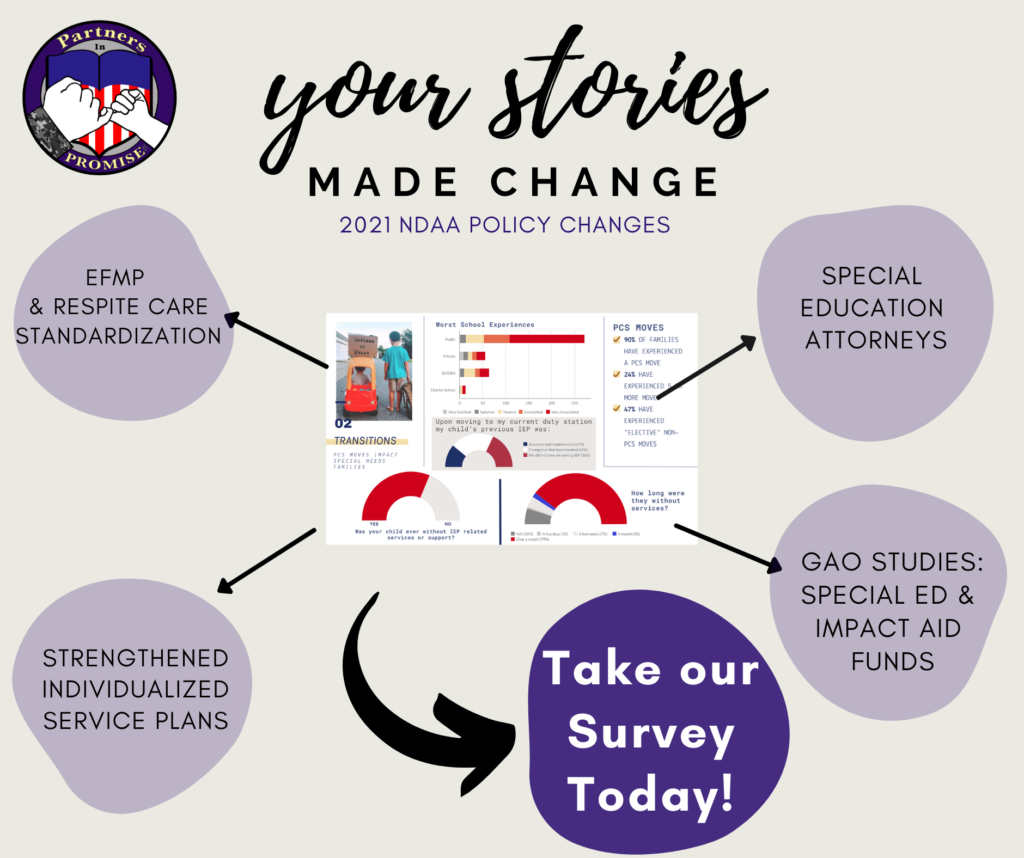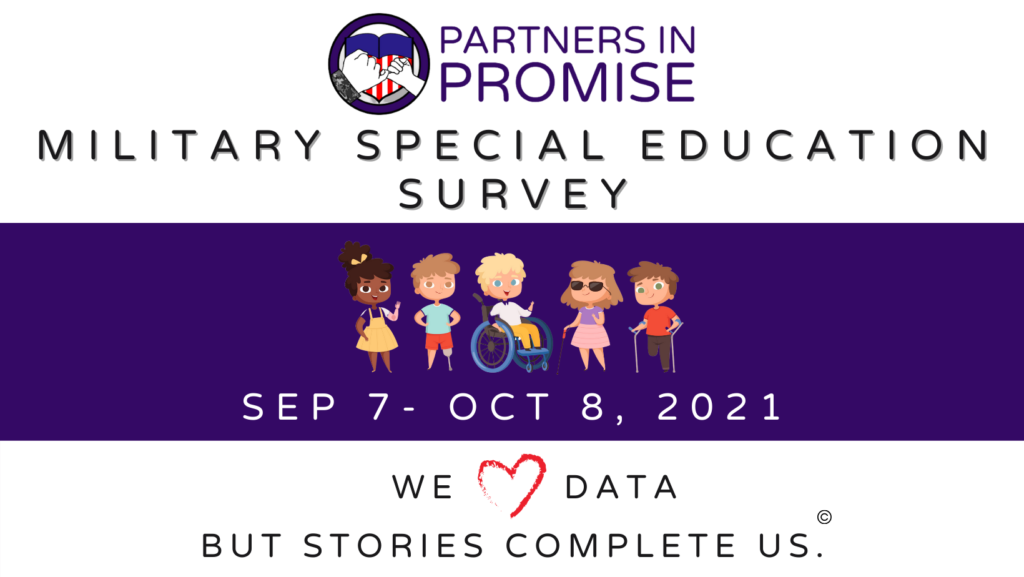By Carla Wyrsch
Surveys are everywhere. Just when you finish taking one, another pops up. But don’t get burnt out! Surveys are the way that military and congressional leadership make decisions that affect your life. Partners in PROMISE is asking military families who have Exceptional medical or learning needs to take 15 minutes to tell their stories by taking their annual Military EFMP/Special Education Survey.


Veterans, Coast Guard, not enrolled in the Exceptional Family Member Program: Partners in PROMISE wants to hear from you too! This year’s survey is designed to learn more about military family special education and medical diagnostic timelines. How much time passed between a parental “gut feeling”/identification of an issue to an official diagnosis or from diagnosis to receipt of special education services? Partners in PROMISE wants to understand how the military lifestyle impacts all Exceptional military families, covered by EFMP or not.
Surveys translate a story into change
Surveys allow organizations to collect data from a specific population and then analyze and draw conclusions from the data collected. More importantly, on a human level, they help tell a story; giving voice to issues that affect a majority.
Last year Partners in PROMISE (PiP) conducted their annual Military Special Education Survey from September 8th- October 9th, 2020. During the survey period, hundreds of families participated; sharing their stories and frustrations. The organization utilized their survey data to elevate the voices of parents frustrated with gaps in special education services pre/post-PCS transition. These families reported a lack of support and with inconsistencies in the Exceptional Family Member Program (EFMP).
Armed with survey data and the stories of military families just like her own, Michelle Norman, Executive Director of Partners in PROMISE shared the stories of military children with special needs with folks on Capitol Hill. In January of this year, the 2021 National Defense Authorization Act (NDAA) was finalized, including historic changes for the education of military children in special education across all service branches. The 2021 NDAA included:
- Special education attorneys for all branches of service
- Standardization of EFMP and respite care programs
- GAO study on impact aid funds and barriers to Free Appropriate Public Education (FAPE)
- Case management model for EFMP
- Individualized services plan program was STRENGTHENED (not removed as originally proposed by the Senate version of the bill)
Despite these improvements Partners in PROMISE wants to know what families are actually experiencing.
Transforming Data into Solutions
“When families move to a new area they need to hit the ground running with an IEP in place so their child can start progressing with minimal delay,” said Jennifer Barnhill, Chief Operating Officer of PiP. “Instead of easing in, special education families hit a wall. After they move their IEP is delayed, changed, with many districts requiring additional testing, delaying the transition.”
Last year’s survey revealed that 79 percent of respondents reported their child went without services for over a month, setting back educational progress while increasing family stress and decreasing family readiness. Barnhill said to support military families, this year, the organization is focused on finding ways to help military special education families hit the ground running. Two recommendations from PiP to assist military families smooth the PCS transition:
1) allow military families to retain their previous IEP for up to 6 months after a PCS move.
2) allow all military families to enroll their children in advance of their PCS move by improving access to remote enrollment.
PiP’s recent survey has provided the organization with data points that have driven their advocacy efforts thus far, and they know that when surveys are repeated over time, the information received will have a more powerful impact. PiP is currently utilizing the findings from their previous surveys to build and shape their 2022 Military Special Education Survey set to be released fall of this year.
What You Can Do
Do you want to affect change with Partners in PROMISE? Do you want your voice to be heard? If you answered yes, take ALL the surveys that will help give you and others a voice. Take the Partners in PROMISE annualMilitary Special Education Survey which is open now through October 8, 2021! Take a Blue Star Family survey! Take the Military Child Education Coalition Survey. Complete an Interactive Customer Evaluation Survey about your installation services!
Also, read the survey results, ask questions and follow up if your concerns are not addressed. Whether it’s formal or informal, digital, mail-in, or over the phone, complete the survey. Let your voice be heard; our leaders are listening!
Take the Partners in PROMISE Survey TODAY: https://bit.ly/militaryspecialeducationsurvey
Carla Wyrsch is a Marine Corps’ spouse and mother of two. Carla is a guest blogger and volunteer with Partners in PROMISE, a nonprofit dedicated to “Protecting the Rights Of Military children In Speial Educcation.” She has devoted her career to educating and advocating for children with disABILITIES. Her experience spans a variety of settings, including residential treatment facilities, military bases, public schools, and the Cleveland Clinic Children’s Learner School for Autism. In addition to her work with children, she enjoys providing coaching sessions to both professionals and parents in the areas of behavior modification and other best practices.

